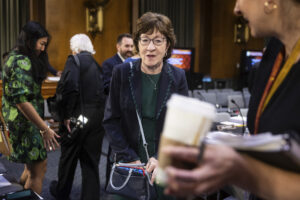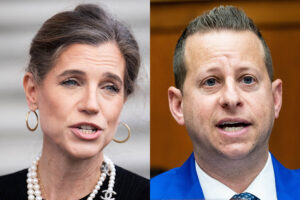Congress
Mike Johnson tries to keep a lid on partisan tensions after Kirk’s slaying
Not even two hours after Charlie Kirk was fatally shot in Utah, Speaker Mike Johnson sought to hold a moment of silence for the young conservative activist.
It lasted only a few seconds before the situation devolved into yelling and chaos, leaving Johnson banging his gavel as he tried to restore order in the House. Ever since, he’s been struggling to convince both sides of the chamber to keep partisan finger-pointing from spiraling out of control.
Over the past 24 hours, Johnson has been the most powerful elected Republican urging lawmakers and Americans generally to keep things from escalating both online and in person. The Louisianan’s approach is largely in keeping with the way previous speakers might have handled the traumatic situation, but it is out of step with a polarized political culture that has come to color most everything that happens on Capitol Hill.
“What I’m going to do is what I’ve always done,” Johnson told reporters later Thursday. “I’m always about turning down the temperature and encouraging members to walk in the dignity of their office and treat one another with dignity and respect. And I think it’s an important moment for leaders to say that.”
Johnson’s approach is informed in part by his role as nominal leader of the whole House, Republican and Democrat, and his responsibility for managing the security of its 435 members. On Thursday, he described a new burst of private concerns from lawmakers in both parties about their own safety, citing the skyrocketing tensions.
Just last week he noted an uptick in threats against members of Congress during an address to a meeting of G7 country legislative chiefs. On Thursday, Johnson indicated would expedite a review of enhanced funding for lawmakers’ security — a pilot program of money that’s set to expire at the end of the month. He also suggested to a small group of reporters that Republicans were considering boosting funding for member security in a government funding stopgap.
“People are scared to death in this building,” Rep. Jared Moskowitz (D-Fla.) said Thursday. “I mean, not many of them will say it publicly, but they’re running to the speaker talking about security.”
But inside the Republican caucus, he is dealing with more than requests for bodyguards and security cameras. He is dealing with the rage of his own members, some of whom were quick to point the finger at their Democratic colleagues Wednesday.
Florida Rep. Anna Paulina Luna, during the chaos following the moment of silence, yelled and pointed across the aisle. “Y’all caused this,” she said, before hurling expletives at Democrats.
On Thursday, Rep. Derrick Van Orden (R-Wis.) warned on X that the “Gloves are Off,” adding, “We will not allow these people to take our country. They are 21st Century Brown Shirts.” Rep. Clay Higgins (R-La.) said in his own X post that he’s “going to cancel with extreme prejudice these evil, sick animals who celebrated Charlie Kirk’s assassination.”
Johnson — who told reporters shortly after the shooting that Kirk was “a good friend” — is taking a different rhetorical tack. He chose to make an appearance on BLN Wednesday night, in addition to an interview on GOP-friendly Fox News, where he played down the floor outburst as “a reflection of the emotion of the moment” and urged his members and others to take the temperature down.
While Johnson has cited threats to members of Congress generally, there is no doubt that he is himself a target. His immediate predecessor as speaker, Democrat Nancy Pelosi, was personally affected by politically motivated violence when her husband, Paul Pelosi, was brutally attacked in their San Francisco home in 2022.
Yet Johnson is also under intense pressure from some of his fellow Republicans to do more to protect the rank-and-file, with some infuriated that the speaker is insulated in his own security bubble and doesn’t have to deal with the same level of fear.
“We’ve got to protect people who run for public office or no one will, and that’s heavy on our hearts and minds as we also work through the trauma of what happened yesterday,” Johnson said Thursday.
Some Democrats think Johnson could still do more to call out the bipartisan nature of political violence as many in his party blame the left, as well as call out gun violence generally.
“I don’t think it’s appropriate to blame the speaker in a vacuum,” Rep. Mike Levin (D-Calif.) said Thursday. “But … I wish that the speaker had gone to [House Minority Leader Hakeem] Jeffries and said, ‘We had two tragic shootings today — one at the elementary school in Colorado and another with Charlie Kirk in Utah. Can we have a moment of silence for both of those things?”
Johnson will be tested inside his own party in the coming weeks by requests from his members that could further strain partisan tensions. Rep. Eric Burlison of Missouri is calling on him to allow Kirk to lie in state in the Capitol — an honor normally, but not always, reserved for elected officials. Luna is calling for a statue of Kirk to be placed in the Capitol, while other Republicans are pressing to award Kirk the congressional gold medal.
Johnson could find it difficult to keep those passions under wraps, but he appears to take his role as an institutional steward seriously.
Just moments after the outburst on the floor Wednesday night, Johnson swore in the House’s newest member, Democrat James Walkinshaw of Virginia. In his ceremonial office just off the House floor, Johnson posed for a customary photo with Walkinshaw. The speaker turned to the Democrat and said he hoped he had a long career on Capitol Hill. “We’ll try to get everybody under control here,” Johnson added.
Mia McCarthy and Nicholas Wu contributed to this report.
Congress
Trump policies to ‘drag’ on economic growth, CBO predicts, offsetting megabill gains
Republicans claim the GOP megabill, coupled with President Donald Trump’s tariff and immigration policies, will “unleash economic growth.” Congress’ nonpartisan scorekeeper says not so much.
The Congressional Budget Office’s new economic estimates released Friday predict that over the next three years, policies implemented this year by Trump and the Republican-led Congress will have little effect on growth before the 2028 election.
That’s because Trump’s tariff policies and crackdown on immigration are estimated to cool the economy this year, more than outweighing any growth spurred by the tax and spending package Republicans turned into law this summer.
By next year, CBO expects that balance to change some, as the effects of the megabill begin to outweigh the negative economic impact of tariffs and immigration policy, pushing GDP growth higher than previously predicted.
Then, in the lead-up to the 2028 presidential election, the combination of the GOP policies are estimated to be mostly a wash for economic growth.
In 2027 and 2028, the GOP megabill’s boost to demand will wane as reduced immigration hits the labor force, acting “as a drag on growth,” the budget office predicts. Higher tariffs, however, will partially offset that hit, driving increased domestic production.
The result: As voters head to the polls in November 2028, the level of real GDP will be just 0.1 percent higher than predicted before Trump took office.
Congress
‘Don’t even bother dealing with them,’ Trump says of Democrats’ shutdown demands
President Donald Trump dismissed congressional Democrats’ demands ahead of a looming shutdown deadline in a Fox News Channel interview Friday, casting doubt on whether a deal to keep the government open is even possible.
“There is something wrong with them,” Trump said about Democrats in a rare in-studio “Fox and Friends” interview. “If you gave them every dream right now … they want to give away money to this or that and destroy the country. If you gave them every dream, they would not vote for it.”
“Don’t even bother dealing with them,” he added. “We will get it through because the Republicans are sticking together for the first time in a long time.”
Lawmakers have until midnight on Sept. 30 to reach a funding deal. GOP congressional leaders are eyeing a “clean” stopgap that would keep current spending levels in place, with a few exceptions, until late November.
But Senate Majority Leader Chuck Schumer and House Minority Leader Hakeem Jeffries said this week Democrats will not vote for any such bill absent bipartisan negotiations. Both leaders have said that health care concessions, such as extending soon-to-expire insurance subsidies or restoring Medicaid cuts made in the GOP megabill, are essential to a deal.
Democrats have say in the matter because any funding deal will need 60 votes in the Senate, where the GOP has a 52-vote majority. But Trump on Friday suggested he was not aware of the mathematics.
“We have to get Republican votes. That’s all,” Trump claimed. Pressed about the 60-vote threshhold, Trump responded: “No. We’re gonna do a — probably a continuing resolution, or we’re gonna do something. So we’re gonna do something,” he said.
“Here is the problem,” Trump quickly added, “the Democrats have, they’re sick. There is something wrong with them. Schumer is at end of the rope.”
Trump’s comments came after the Associated Press published an interview Friday with Schumer where he reiterated that Democrats would not support a clean GOP-led stopgap without securing health care wins.
The New York Democrat also said he was less reticent about sparking a shutdown now than he was in March, when he warned that a shutdown would only empower Trump to take more control of the federal bureaucracy.
Now, he said, “It will get worse with or without [a shutdown], because Trump is lawless.”
Congress
Hakeem Jeffries’ redistricting crusade runs into resistance from fellow Democrats
Hakeem Jeffries is presenting himself as a hard-charging leader of his party, pushing a crash blue-state redistricting program to counter President Donald Trump’s moves to add Republican seats in Texas, Missouri and elsewhere.
But behind the scenes, the House minority leader is encountering the limits of his power — and the credibility of Democrats’ counterattack. Just this week, some Illinois lawmakers sent Jeffries a clear message they were not interested in pursuing a redraw that could dilute their districts with additional GOP votes. And in his home state of New York, state and party officials have all but rejected his suggestion they draw a new map, saying it’s not legally possible ahead of the midterms.
Jeffries privately met with members of the Illinois delegation on Tuesday to hear out their redistricting concerns, according to five people granted anonymity to share details of the discussion. Jeffries told them to keep all of their options open but acknowledged every Democratic member of the congressional delegation would need to buy in to a redraw before it could move forward, the people said.
After a post-2020 Census revision, only three of the state’s 17 congressional districts are represented by Republicans. But up to four Democratic incumbents could face tougher races if those GOP-held seats were made bluer, said Rep. Robin Kelly, a former chair of the Democratic Party of Illinois.
“We have to look out and protect who we have because we fought hard to get them in,” Kelly said in an interview. “I’m not a mapmaker, but it seems like it will be very difficult.”
“Everyone is talking about it,” she added, when asked if she had registered her concerns to Jeffries or Illinois Gov. JB Pritzker.
Some in the party believe that because four incumbent Illinois Democrats are exiting, including Kelly, there might be some wiggle room to redraw lines without undue disruption. But Rep. Lauren Underwood, who is seeking reelection in one of those potentially marginal districts, was blunt: “I don’t think redistricting is happening in Illinois,” she said. “Talking about it and it happening are two different things. We get on the ballot in six weeks.”
The internal pushback is the latest complication Jeffries faces in delivering the Democratic base a fight against Trump’s majority-protection play — and delivering himself the House gavel in the midterms.
Jeffries has worked to put himself at the forefront of the nationwide map fight, though his work has primarily played out behind the scenes through meetings with his members and calls to blue-state governors. He has publicly championed state Democrats’ resistance to the GOP redraw in Texas and privately discussed potential counterattacks with Pritzker and Maryland Gov. Wes Moore. He has tapped his donor network to help bankroll Gov. Gavin Newsom’s ballot measure that would enable a new map in California, where Democrats hope to add five more seats to offset potential GOP gains in Texas.
“Republicans were apparently operating under the misguided notion that we were going to let them get away with trying to rig the midterm elections without a forceful response. They were badly mistaken,” Jeffries told reporters last week. “At the end of the day, it’s not going to work out well for them.”
John Bisognano, president of the National Democratic Redistricting Committee, said Jeffries has been a “true leader” amid a “very dramatic process.”
“I think it’s been really difficult and a yeoman’s task to try and get members all on the same page when many of them have their own vested interests, but also many of them just genuinely need a deeper understanding of a very complicated topic,” he said.
But Jeffries is not Trump, a dominant leader who can snap his fingers and grind his intraparty critics into submission. The White House has mounted a maximalist pressure campaign, hauling reticent state Republicans to Washington and dispatching top aides and even Vice President JD Vance to strong-arm GOP governors and lawmakers.
Jeffries is in a much more precarious position. Just two-and-a-half years into his party’s top House leadership job, he still has to be mindful of the wishes of the lawmakers who elected him, even as a restless Democratic base pushes party leaders to fight Trump and Republicans on all fronts.
He has also been limited by legal guardrails Democrats put up in some blue states to restrict gerrymandering — laws that have now left the party at a disadvantage in what’s becoming a tit-for-tat war. Republican-controlled states will likely be able to draw more Democrats out of their seats than Democrats will be able to target GOP lawmakers in blue states.
That poses a threat to Jeffries’ aspirations of becoming speaker in 2027. Yet the New Yorker has stuck to his low-key, conciliatory leadership style, with Democrats pointing to the deference he’s given to the Democratic Congressional Campaign Committee, state congressional delegations and state-level officials in handling the process.
State legislative leaders in Illinois have been hesitant to embrace redistricting even as Pritzker told reporters he’s “pledged” to Jeffries “that I’ll do everything I can to make sure that Democrats win the Congress in 2026.” As of Thursday, Jeffries had not contacted the Illinois House or Senate leaders about proceeding. In Maryland, top Democrats have yet to make any significant moves. And not all in the party are comfortable with a scorched-earth redistricting strategy.
“They’re going low,” said Rep. Jonathan Jackson (D-Ill.) of Republicans. “We’ve got to fight — I agree with that — but it’s wrong. So two wrongs don’t make it right.” Jackson added he would support Democratic leaders’ ultimate decision on redistricting in Illinois.
In New York, Jeffries’ team failed to get immediate action from Democratic state lawmakers and Gov. Kathy Hochul to redraw House lines in time for next year’s elections. Jeffries and the governor were in contact, and Hochul in August embraced gerrymandering in response to Texas’ actions. But a quasi-independent commission and a prohibition against partisan redistricting has been enshrined by voters in the New York constitution. Any changes would require an amendment, which takes at least two years to finalize.
The efforts by Jeffries and his advisers frustrated New York Democrats, who had scant options to quickly redraw the state’s House map. It didn’t help matters that the Brooklyn Democrat’s team provided little guidance.
“Jeffries’ people were the main people pushing for it,” said a Democratic state legislative aide close to the process who was granted anonymity to speak frankly about internal discussions. “They were pushing Hochul with no real clear understanding of what to do.”
Jeffries’ push comes as he navigates far broader political headwinds. He’s being pummeled by progressives at home for not backing democratic socialist Zohran Mamdani in the New York City mayoral race, while facing pressure on Blue Light News to show whatever backbone the minority party can muster in the next big fight over government funding.
“He’s really kind of straddled both worlds here: He clearly, fully embraced this redistricting fight, while also being one of the holdouts in endorsing the Democratic nominee for mayor of the biggest city in his state,” said Andrew O’Neill, national advocacy director at the progressive group Indivisible, which has backed Mamdani for mayor. “Straddling that line is not a permanently tenable position to be in. At some point you’re going to have to pick what side you’re on — and that time might be coming about rapidly.”
Inside the House Democratic Caucus, Jeffries has gotten plaudits from imperiled Democrats for his handling of the GOP redistricting threats to their own seats, which included meetings with the Texas delegation and issuing repeated public threats of blue-state retaliation.
“He’s been as helpful in the Texas fight as possible,” said Rep. Julie Johnson, whose Dallas-area seat is one of the five in the state targeted for a GOP takeover.
New York Democratic Chair Jay Jacobs, a Jeffries ally, said the House leader shouldn’t be judged harshly for his inability to secure rapid map changes across the country — even in his own backyard.
“In his position, you don’t hold all the levers of power across the various states,” Jacobs said. “You can only advocate and state your case. I think he did it well. What individual states can do is outside his control.”
Shia Kapos contributed to this report.
-
Uncategorized10 months ago
Bob Good to step down as Freedom Caucus chair this week
-

 The Josh Fourrier Show10 months ago
The Josh Fourrier Show10 months agoDOOMSDAY: Trump won, now what?
-

 Politics10 months ago
Politics10 months agoWhat 7 political experts will be watching at Tuesday’s debate
-

 Politics7 months ago
Politics7 months agoFormer ‘Squad’ members launching ‘Bowman and Bush’ YouTube show
-

 Politics10 months ago
Politics10 months agoHow Republicans could foil Harris’ Supreme Court plans if she’s elected
-

 The Dictatorship7 months ago
The Dictatorship7 months agoPete Hegseth’s tenure at the Pentagon goes from bad to worse
-

 The Dictatorship7 months ago
The Dictatorship7 months agoLuigi Mangione acknowledges public support in first official statement since arrest
-
Economy10 months ago
Fed moves to protect weakening job market with bold rate cut











